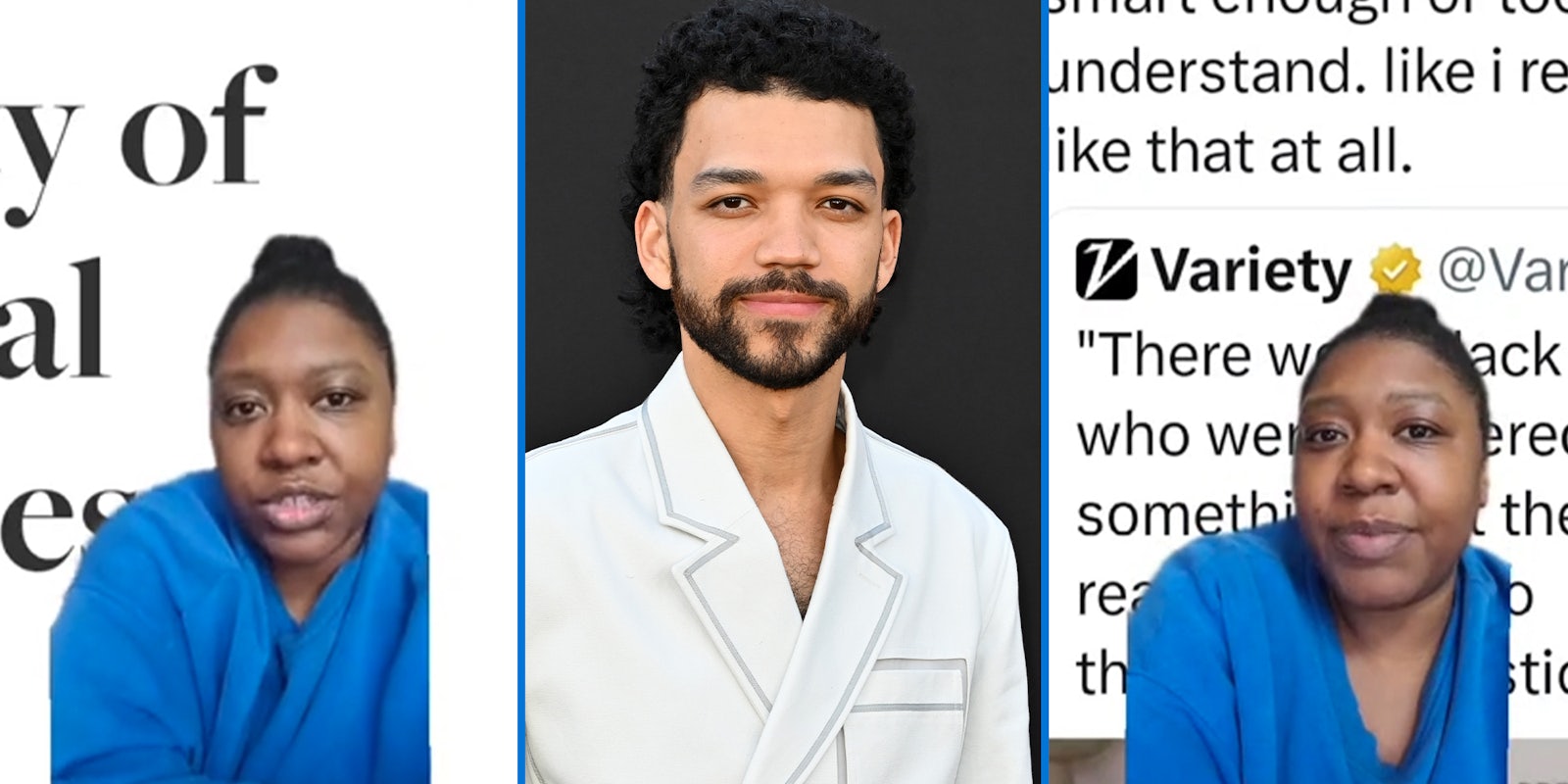The Sundance Film Festival’s recent screening of The American Society of Magical Negroes has stirred significant controversy. Natalie (@nataliethehero) discusses the hoopla, and its star’s recent comments in a trending clip with 289,000 views on TikTok. This satirical fantasy comedy, directed by Kobi Libii, has garnered many critical reactions, particularly from African American audiences and critics.
“This movie is a hard no,” said one of the commenters.
Others had words on star Justice Smith’s career. “I want Justice Smith to want more for himself lol,” wrote another person. Said another commenter: “Dude, I feel so bad for Justice Smith. He came out of the gate swinging w/ his career but has made/ been pushed into some bad duds.” “After “The Get Down” “Detective Pikachu” and “The Quarry” I thought Justice Smith’s career was going to take off :/ makes me sad,” wrote yet another person.
@nataliethehero ♬ original sound – n a t a l i e
As mentioned by Natalie, journalist Robert Daniels, contributing to RogerEbert.com and renowned outlets like the New York Times, gave a scathing review, stating, “The American Society of Magical Negroes lacks politics, coherency, and the grand vision necessary for vast world-building.” His review paints a picture of a film with a promising start that ultimately fails to deliver a coherent message or meaningful critique of the anti-Black world it depicts.
As Daniels points out, the film begins on a high note but quickly descends into confusion, culminating in a hollow conclusion against its attempted humor. Daniels emphasizes the film’s failure in world-building and character development, particularly critiquing its protagonist, Aren, played by Justice Smith, for being frustratingly underdeveloped.
Smith revealed the film’s divisive reception from focus groups. In a discussion at Sundance, he highlighted the varying reactions among Black viewers, with some feeling triggered and others seeing reflections of their experiences. “Black people were triggered by seeing something that they weren’t ready to admit in themselves,” Smith shared, perhaps also defending Libii. He praised the film for showcasing the diversity within the Black community and pushing the boundaries of Black art.
However, reactions to Smith’s comments and the film have been mixed. Some viewers criticized the insinuated narrative that Black people who disliked the movie were too ignorant to understand it. Others expressed disappointment in the film’s focus on white-centric themes, hoping instead for a film that celebrated Black magic.
One viewer’s feedback encapsulates the general sentiment: “I saw the movie, and it’s just not as interesting as they think it is. It’s banal in its attempt at being provocative. It centers whiteness and placates the sensibilities of the group it claims to be critiquing.”
The American Society of Magical Negroes is billed as a satire of the Magical Negro trope, a concept widely criticized for perpetuating outdated and racist stereotypes in American cinema. The Magical Negro, typically a supporting character in film and literature, is often portrayed with mystical powers or unique insights, existing mainly to aid white protagonists. This trope, criticized by film director Spike Lee and others, is seen as a modern-day extension of racist archetypes like “Sambo” or the “noble savage.”
The film’s intent to critique this trope and the anti-Black world seems lost in execution, as indicated by Daniels’ review and audience reactions. This disconnect raises questions about the effectiveness of satire in addressing complex racial issues and the responsibility of filmmakers in creating works that are both thought-provoking and respectful of the communities they represent.
Despite its star-studded cast, including David Alan Grier, An-Li Bogan, Drew Tarver, and Nicole Byer, critics say The American Society of Magical Negroes struggles to balance its satirical elements with meaningful commentary. The film’s tepid reception at Sundance and its polarizing impact on the focus group suggest a missed opportunity to thoughtfully engage with critical themes surrounding race and representation in cinema.
Doubling down on the tepidness, the Hollywood Reporter writer Jourdain Searles declared, “Ultimately, The American Society of Magical Negroes is a film bogged down by its filmmaker’s inability to make the central joke work.”
As the film gears up for its theatrical release by Focus Features on March 15, how wider audiences will receive it remains to be seen. The discourse in this TikTok video suggests a need for more nuanced and respectful approaches to storytelling, especially when dealing with sensitive topics like race and identity.
However, a review from BlackGirlNerds.com writer Catalina Combs suggests the satire had hit its target, calling it “a must-see satire about what it means for Black people to protect and care for ourselves and each other.”
The film serves as a case study of the challenges and responsibilities of creating art that aims to critique societal norms. Its reception at Sundance and online underscores the importance of authenticity and sensitivity in storytelling, particularly when exploring themes of race and identity.
The American Society of Magical Negroes presents a tricky narrative that has sparked significant debate and reflection. While its intention to execute satire on a problematic trope is clear, its execution may leave much to be desired. As the film industry continues to grapple with issues of representation and diversity, this movie stands as a reminder of the importance of thoughtful and respectful storytelling.
The Daily Dot contacted TikTok user Natalie (@nataliethehero) via TikTok comment. Check out the trailer below.


